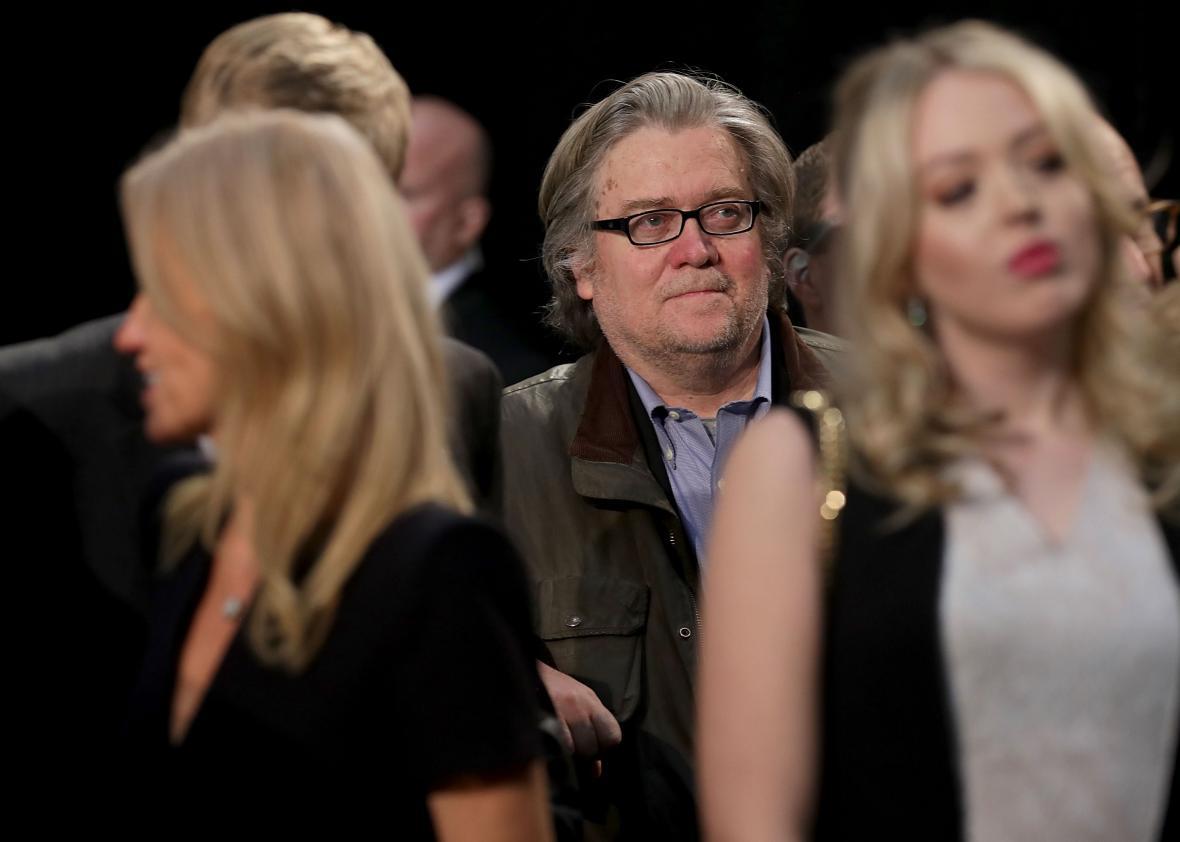Even well before he was Trump campaign CEO, incoming chief White House strategist and senior counselor Stephen K. Bannon very much seems to have had President-elect Donald Trump’s ear. According to an excellent Washington Post write-up of a series of radio interviews between Bannon and Trump during the earlier stages of the presidential campaign, Bannon often appeared to use flattery to help convince Trump of his far-right positions.
It is an absolutely fascinating analysis of the psychological dynamic between the incoming president and a man who made his political name turning his website Breitbart into a clearinghouse for racist propaganda, in which the adviser appears to have the upper hand.
Bannon interviewed Trump during more than two hours of one-on-one conversations between November 2015 and June for Breitbart News Daily, a radio show on the “Patriot” channel on SiriusXM.
David A. Fahrenthold and Frances Stead Sellers describe the techniques Bannon used to repeatedly flatter Trump’s ego from their very first radio exchange:
When Trump came on the air, the first thing Bannon wanted to talk about was how well Trump was doing in his campaign—and how Bannon had noticed it before other people did.
“I said, ‘This guy, people are leaning forward in these audiences when he’s talking,’ ” Bannon said, recalling earlier conversations about Trump’s run. “And we were mocked and ridiculed.”
Trump was happy to oblige that conversation, boasting about the sizes of his crowds. Bannon apparently had other sycophantic tactics as well:
In most of the interviews, Bannon often called his subject “sir” or “Mr. Trump.” Trump called his interviewer “Steve.”
In his questions, Bannon often began with praise for Trump. Asking about foreign affairs, for instance, Bannon praised Trump’s capacity for dealmaking.
“It’s complicated,” Bannon said. “That’s your calling card.”
“I love complicated,” Trump responded. “I thrive on complicated.”
The two Post reporters also described a dynamic by which this sort of flattery would generally precede a leading question about policy, during which Bannon would attempt to sway Trump to his position:
Last December, Bannon told Trump that, “I know you’re a student of military history.” Then, he laid out a case for questioning the U.S. alliance with Turkey, a member of NATO since the 1950s.
During one such instance, “Bannon presented the problems of climate change and the Islamic State as a binary option—offering Trump, in effect, the choice of fighting one or the other,” the Post reported. Trump responded by saying what others considered to be climate change was probably just weather.
One of the rare times Trump reportedly disagreed with Bannon was on the issue of highly educated foreign tech workers coming into this country on visas, during which the Breitbart boss seemed ready to argue that there are too many Silicon Valley leaders of Asian and South Asian descent.
Last November, for instance, Trump said he was concerned that foreign students attending Ivy League schools have to return home because of U.S. immigration laws.
“We have to be careful of that, Steve. You know, we have to keep our talented people in this country,” Trump said. He paused. Bannon said, “Um.”
“I think you agree with that,” Trump said. “Do you agree with that?”
Bannon was hesitant.
“When two-thirds or three-quarters of the CEOs in Silicon Valley are from South Asia or from Asia, I think . . . ” Bannon said, not finishing the sentence. “A country is more than an economy. We’re a civic society.”
Trump said he would build a border wall, but still wanted to let highly educated foreign students who graduate from U.S. colleges to be able to stay in the country.
“I still want people to come in,” Trump said. “But I want them to go through the process.”
Bannon said: “You got to remember, we’re Breitbart. We’re the know-nothing vulgarians. So we’ve always got to be to the right of you on this.”
“Oh, that’s OK,” Trump said.
This would not be the first time someone has suggested that Bannon has been manipulating Trump like a puppet. At the final presidential debate last month, Mark Cuban told me he thought this was precisely what was going on.
“I literally think Steve and his crew is smarter than Donald, they’re using him, this will go down in history as the one time one of the two party presidential candidates has been played and played like a puppet,” Cuban told me.
“He’s the puppet, Steve Bannon is playing the strings,” Cuban added.
